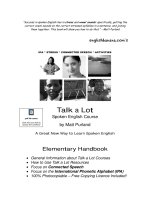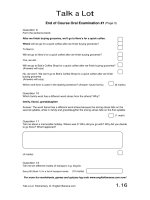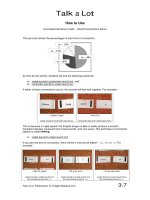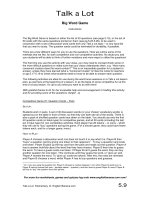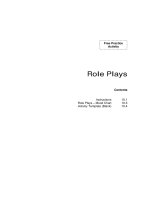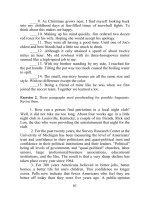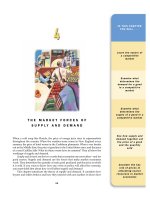Tài liệu Collins cobuild student grammar part 7 ppt
Bạn đang xem bản rút gọn của tài liệu. Xem và tải ngay bản đầy đủ của tài liệu tại đây (48.85 KB, 15 trang )
For more material and information, please visit Tai Lieu Du Hoc
at www.tailieuduhoc.org
Note that all of these verbs except for `describe' can also be followed by a `that'-clause. See Unit 76.
He denied that he was involved.
* verbs of liking and disliking
adore, detest, dislike, dread, enjoy, fancy, like, love, mind, resent
Will they enjoy using it?
I don't mind telling you.
`Like' and `love' can also be followed by a `to'-infinitive clause. See Unit 71.
* other common verbs
avoidcommencedelayfinishinvolvekeep
misspostponepractiseresistriskstop
I've just finished reading that book.
Avoid giving any unnecessary information.
* common phrasal verbs
burst out, carry on, end up, give up, go round, keep on, put off, set about
She carried on reading.
They kept on walking for a while.
Note that some common phrases can be followed by an `-ing' clause.
can't helpcan't standfeel like
I can't help worrying.
2 After the verbs and phrases mentioned above, you can also use `being' followed by a past participle.
They enjoy being praised.
I dislike being interrupted.
After some verbs of saying and thinking, you can use `having' followed by a past participle.
admitdenymentionrecall
Michael denied having seen him.
3 `Come' and `go' are used with `-ing' clauses to describe the way that a person or thing moves.
They both came running out.
It went sliding across the road out of control.
`Go' and `come' are also used with `-ing' nouns to talk about sports and outdoor activities. See Unit 56.
Did you say they might go camping?
4 Some verbs can be followed by an object and an `-ing' clause. The object of the verb is the subject of the `-ing'
clause.
catchimaginepreventwatch
findleavestop
For more material and information, please visit Tai Lieu Du Hoc
at www.tailieuduhoc.org
It is hard to imagine him existing without it.
He left them making their calculations.
Note that `prevent' and `stop' are often used with `from' in front of the `-ing' clause.
I wanted to prevent him from seeing that.
Most verbs of perception can be followed by an object and an `-ing' clause or a base form. See Unit 72.
I saw him riding a bicycle.
I saw a policeman walk over to one of them.
See also Unit 94 for `-ing' clauses after nouns.
Unit 70 Infinitives
Main points
* Some verbs are followed by a `to'-infinitive clause. Others are followed by an object and a `to'-infinitive clause.
* Some verbs are followed by a `wh'-word and a `to'-infinitive clause. Others are followed by an object, a `wh'-
word, and a `to'-infinitive clause.
* Nouns are followed by `to'-infinitive clauses that indicate the aim, purpose or necessity of something, or that
give extra information.
1 Some verbs are followed by a `to'-infinitive clause. The subject of the verb is also the subject of the `to'-infinitive
clause.
* verbs of saying and thinking
agreeexpectlearnplan
choosehopemeanpromise
decideintendofferrefuse
She had agreed to let us use her flat.
I decided not to go out for the evening.
* other verbs
failmanagepretendtendwant
England failed to win a place in the finals.
2 Some verbs are followed by an object and a `to'-infinitive clause. The object of the verb is the subject of the `to'-
infinitive clause.
* verbs of saying and thinking
adviseencourageinvitepersuadeteach
askexpectorderremindtell
I asked her to explain.
They advised us not to wait around too long.
* other verbs
allowforcegethelpwant
For more material and information, please visit Tai Lieu Du Hoc
at www.tailieuduhoc.org
I could get someone else to do it.
I didn't want him to go.
Note that `help' can also be followed by an object and a base form.
I helped him fix it.
WARNING: You do not use `want' with a `that'-clause. You do not say `I want that you do something'.
3 Some verbs are followed by `for' and an object, then a `to'-infinitive clause. The object of `for' is the subject of
the `to'-infinitive clause.
appealaskpaywish
arrangelongwait
Could you arrange for a taxi to collect us?
I waited for him to speak.
4 Some link verbs, and `pretend' are followed by `to be' and an `-ing' form for continuing actions, and by `to have'
and a past participle for finished actions. See also Unit 73.
We pretended to be looking inside.
I don't appear to have written down his name.
5 Some verbs are normally used in the passive when they are followed by a `to'-infinitive clause.
believe, consider, feel, find, know, report, say, think, understand
He is said to have died a natural death.
Is it thought to be a good thing?
6 Some verbs are followed by a `wh'-word and a `to'-infinitive clause. These include:
askexplainimaginelearnunderstand
decideforgetknowrememberwonder
I didn't know what to call him.
She had forgotten how to ride a bicycle.
Some verbs are followed by an object, then a `wh'-word and a `to'-infinitive clause.
askremindshowteachtell
I asked him what to do.
Who will show him how to use it?
Some verbs only take `to'-infinitive clauses to express purpose.
See Unit 97.
The captain stopped to reload the gun.
He went to get some fresh milk.
7 You use a `to'-infinitive clause after a noun to indicate the aim of an action or the purpose of a physical object.
We arranged a meeting to discuss the new rules.
He had nothing to write with.
You also use a `to'-infinitive clause after a noun to say that something needs to be done.
For more material and information, please visit Tai Lieu Du Hoc
at www.tailieuduhoc.org
I gave him several things to mend.
`What's this?' - `A list of things to remember.'
8 You use a `to'-infinitive clause after a noun group that includes an ordinal number, a superlative, or a word like
`next', `last', or `only'.
She was the first woman to be elected to the council.
Mr Holmes was the oldest person to be chosen.
The only person to speak was James.
9 You use a `to'-infinitive clause after abstract nouns to give more specific information about them.
All it takes is a willingness to learn.
He'd lost the ability to communicate with people.
The following abstract nouns are often followed by a `to'-infinitive clause:
ability, attempt, chance, desire, failure, inability, need, opportunity, unwillingness, willingness
Note that the verbs or adjectives which are related to these nouns can also be followed by a `to'-infinitive clause. For
example, you can say `I attempted to find them', and `He was willing to learn'.
See Unit 95 for information on nouns that are related to reporting verbs and can be followed by a `to'-infinitive clause.
Unit 71 Verb + `to'- or `-ing'
Main points
* Some verbs take a `to'-infinitive clause or an `-ing' clause with little difference in meaning. Others take a `to'-
infinitive or `-ing' clause, but the meaning is different.
1 The following verbs can be followed by a `to'-infinitive clause or an `-ing' clause, with little difference in
meaning.
attempt, begin, bother, continue, fear, hate, love, prefer, start, try
It started raining.
A very cold wind had started to blow.
The captain didn't bother answering.
I didn't bother to answer.
Note that if these verbs are used in a continuous tense, they are followed by a `to'-infinitive clause.
The company is beginning to export to the West.
We are continuing to make good progress.
After `begin', `continue', and `start', you use a `to'-infinitive clause with the verbs `understand', `know', and `realize'.
I began to understand her a bit better.
2 You can often use `like' with a `to'-infinitive or an `-ing' clause with little difference in meaning.
I like to fish.
I like fishing.
However, there is sometimes a difference. You can use `like' followed by a `to'-infinitive clause to say that you think
something is a good idea, or the right thing to do. You cannot use an `-ing' clause with this meaning.
They like to interview you first.
I didn't like to ask him.
For more material and information, please visit Tai Lieu Du Hoc
at www.tailieuduhoc.org
3 After `remember', `forget', and `regret', you use an `-ing' clause if you are referring to an event after it has
happened.
I remember discussing it once before.
I'll never forget going out with my old aunt.
She did not regret accepting his offer.
You use a `to'-infinitive clause after `remember' and `forget' if you are referring to an event before it happens.
I must remember to send a gift for her child.
Don't forget to send in your entries.
After `regret', in formal English, you use a `to'-infinitive clause with these verbs to say that you are sorry about what you
are saying or doing now:
announcelearnsee
informsaytell
I regret to say that it was all burned up.
4 If you `try to do' something, you make an effort to do it. If you `try doing' something, you do it as an experiment,
for example to see if you like it or if it is effective.
I tried to explain.
Have you tried painting it?
5 If you `go on doing' something, you continue to do it. If you `go on to do' something, you do it after you have
finished doing something else.
I went on writing.
He later went on to form a computer company.
6 If you `are used to doing' something, you are accustomed to doing it. If you `used to do' something, you did it
regularly in the past, but you no longer do it now.
We are used to working together.
I used to live in this street.
7 After `need', you use a `to'-infinitive clause if the subject of `need' is also the subject of the `to'-infinitive clause.
You use an `-ing' form if the subject of `need' is the object of the `-ing' clause.
We need to ask certain questions.
It needs cutting.
Unit 72 Verbs with other clauses
Main points
* `Make' and `let' can be followed by an object and a base form.
* Some verbs of perception can be followed by an object and an `-ing' clause, or an object and a base form.
* `Have' and `get' can be followed by an object and a past participle.
* `Dare' is followed by a `to'-infinitive clause or a base form.
1 You can use an object and a base form after `make' to say that one person causes another person to do
something, or after `let' to say they allow them to do something.
My father made me go for the interview.
Jenny let him talk.
2 Some verbs of perception are used with an object and an `-ing' clause if an action is unfinished or continues
over a period of time, and with an object and a base form if the action is finished.
For more material and information, please visit Tai Lieu Du Hoc
at www.tailieuduhoc.org
feelhearseewatch
He heard a distant voice shouting.
Dr Hochstadt heard her gasp.
You normally use an `-ing' clause after `notice', `observe', `smell', and `understand'.
I could smell Chinese vegetables cooking.
We can understand them wanting to go.
3 You can use an object and a past participle after `have' or `get', when you want to say that someone arranges
for something to be done. `Have' is slightly more formal.
We've just had the house decorated.
We must get the car repaired.
You also use `have' and `get' with an object and a past participle to say that something happens to someone, especially if
it is unpleasant.
She had her purse stolen.
He got his car broken into at the weekend.
4 You use `have' followed by an object and an `-ing' clause, or an object and a past participle, when you want to
say that someone causes something to happen, either intentionally or unintentionally.
Alan had me looking for that book all day.
He had me utterly confused.
5 You use `want' and `would like' with an object and a past participle to indicate that you want something to be
done.
I want the work finished by January 1st.
How would you like your hair cut, sir?
6 `Dare' can be followed by a `to'-infinitive clause or a base form in negative or interrogative sentences:
* when there is an auxiliary or modal in front of `dare'
He did not dare to walk to the village.
What bank would dare offer such terms?
* when you use the form `dares' or `dared' (but not `dares not' or `dared not')
No one dares disturb him.
No other manager dared to compete.
You must use a base form in:
* negative or interrogative sentences without an auxiliary or modal before `dare'
I daren't ring Jeremy again.
Nobody dare disturb him.
Dare she go in?
* negative sentences with `dares not' or `dared not'
He dares not risk it.
Sonny dared not disobey.
Note that the phrase `how dare you' is always followed by a base form.
How dare you speak to me like that?
`Dare' is rarely used in affirmative sentences.

